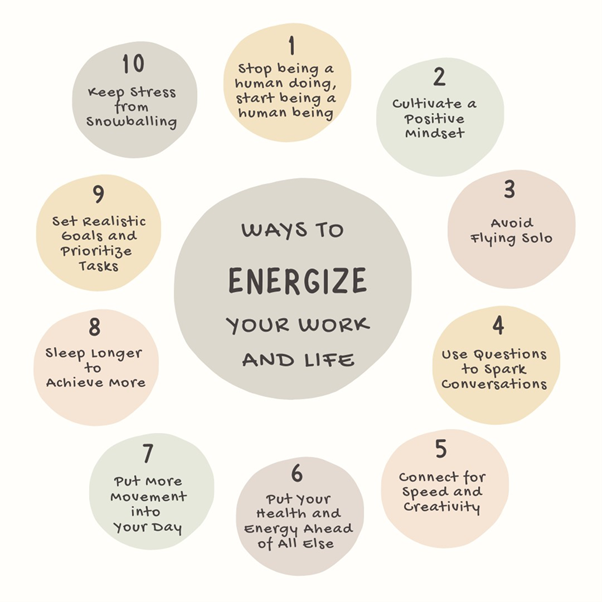
Energizing your work and life doesn’t require drastic changes but rather small, actionable steps, explains Julia Schmidt
We very often rely on our vacations to recharge our batteries. But the energy we are looking for can be gained through purpose, a positive mindset, meaningful relationships, healthy and sustainable choices, focus, and prioritizing. We can secure our wellbeing through small steps and multiple energy sources from our daily lives at work and home. Feeling fully charged does not need to wait until the next vacation. We can energize our life and work by doing things that benefit others, creating more positive than negative moments for ourselves and others, and making choices that improve our mental and physical health. It’s a constant daily task.
Energizing your work and life doesn’t require drastic changes but rather small, actionable steps that can lead to a significant positive impact. Start with finding meaning and purpose in your work. Connecting with the purpose behind your work can provide a sense of fulfilment and motivation. Identifying how your work contributes to a larger goal or positively impacts others can increase your overall energy and satisfaction.
Here are 10 ways to energize work and life that will inspire you to take positive actions in your own work and life. They may not be new to you, but while reading the list, look at the self-assessment questions to reflect on your current practices and identify areas for improvement.

1. Stop Being a Human Doing, Start Being a Human Being
Finding a balance between productivity and personal wellbeing can help us embrace a more mindful approach to life. In his poem “Leisure”, W. H. Davies emphasizes the importance of slowing down and appreciating the simple joys of life. The poem beautifully captures the essence of being present in the moment and finding solace in nature’s beauty. Nature is a tremendous source of energy at our disposal, reminding us of the importance of breaking free from the constant busyness and pressures of modern life and reconnecting with the world around us and our inner being. Time spent in nature is associated with a positive mood, psychological wellbeing, meaningfulness, and vitality.
What is this life if, full of care, We have no time to stand and stare?
W. H. Davies
- Do I allow myself time to stand and stare?
- How often do I connect with nature in my daily life?
- Do I allow myself to engage in activities that bring me joy and fulfilment, even if they are not directly productive?
2. Cultivate a Positive Mindset
Positive thinking and self-talk can significantly impact your energy levels. Challenge negative thoughts and focus on the positive aspects of your work and life. Surround yourself with supportive and positive people who uplift and inspire you.
- Am I aware of my thought patterns and how they influence my energy levels?
- Do I focus more on the positive aspects of my work and life or dwell on the negative?
- Are the people who surround me supportive and positive? What can I learn from them to carry that positive energy forward?
3. Avoid Flying Solo
There is nothing wrong with working on solitary pursuits, but it is essential to know that research shows that people consistently describe social events as their most influential memories.
- How often do I engage in social interactions and meaningful conversations with others?
- Do I prioritize establishing connections and relationships with my colleagues and peers?
- In the best moments of my life, who are the people involved and contributing to these moments?
4. Use Questions to Spark Conversations
People love to talk about themselves and share personal stories. By some estimates, 40 percent of everyday speech consists of people telling others what they think and feel. Talking about our fears, flaws, and follies often leads to an exchange of entertaining stories, creating bonds and building trust and friendships. When we spark a conversation with a colleague or a stranger on a train, airplane, or elsewhere, we become happier. It energizes us.
- How often do I actively listen to others and show genuine interest in their thoughts and experiences?
- Do I engage in conversations that encourage sharing vulnerabilities and personal stories?
- What question can I ask new acquaintances to learn more about what is going on in their work or life?
5. Connect for Speed and Creativity
Relationships boost achievement and create efficiency. Getting together with a group of people you enjoy spending time with puts you in a better mood. Building great relationships at work takes time and effort, but it can start with something as simple as asking a colleague about their weekend, or regularly having lunch with one of your friends.
- How often do I make an effort to build relationships with people I enjoy spending time with at work?
- Do I regularly engage in social activities such as going to lunch with colleagues or participating in team-building?
- Am I aware of the positive impact that strong relationships can have on my mood and overall productivity?
6. Put Your Health and Energy Ahead of All Else
You may have heard this before: Help yourself first before helping others. Think about how your eating, moving, and sleeping routines influence each other daily. Doing all three well is the key to having more energy throughout the day.
- Do I prioritize my physical and mental wellbeing in my daily routine?
- How well do I balance healthy eating, regular exercise, and sufficient sleep?
- What is the one thing I can change today in my lifestyle to improve my energy levels and overall performance?
7. Put More Movement into Your Day
Worldwide, inactivity kills more people than cigarettes. Sitting for several hours a day is almost unavoidable for many people. The challenge is to incorporate as much movement as possible into your day. Try standing and stretching a couple of times every hour or walking over to your colleague’s desk – walking increases energy levels by about 150 percent. Use the stairs. Cycle to work. If walking to work is possible, try doing it twice a week if doing it daily would be too much for you. Walking with a colleague will help you stick to a good routine.
- How often do I incorporate movement breaks or stretching exercises throughout my workday?
- Do I find opportunities to walk or use the stairs instead of relying solely on sedentary activities?
- Am I open to alternative modes of transportation, such as biking or walking to work?
8. Sleep Longer to Achieve More
When you miss one hour of sleep, it decreases your wellbeing, productivity, health, and ability to think. So, sleep is something you should not sacrifice. A study from Harvard Medical School found that lack of sleep costs the American economy $63 billion a year in lost productivity alone.
- Do I prioritize getting enough sleep each night to feel well-rested and rejuvenated?
- Am I aware of the negative consequences of sleep deprivation on my wellbeing and productivity?
- Do I have consistent sleep routines and practices that promote quality sleep?
9. Set Realistic Goals and Prioritize Tasks
Feeling overwhelmed and constantly rushing can drain your energy. Set realistic goals and prioritize your tasks to ensure a manageable workload. Break larger tasks into smaller, more achievable steps to maintain motivation and prevent burnout.
- How often do I feel overwhelmed or rushed due to an excessive workload?
- Can I set realistic goals and break down larger tasks into manageable steps?
- Do I prioritize tasks based on their importance and urgency to maintain a balanced workload?
10. Keep Stress from Snowballing
Consider the things that regularly create stress in your life. Map out how you can avoid these situations in the first place or at least minimize the daily stress they cause. Be aware that your stress level can be unintentionally transferred to others in your social circle. So, make sure you can “turn the volume down” when you are around people who are likely to inherit your stress. Also, defend yourself against inherited stress throughout the day if you have enough emotional stressors of your own to deal with.
- What are the primary sources of stress in my work and life?
- How can I proactively avoid or minimize these stressors?
- Am I aware of how my stress levels affect those around me, and do I take steps to manage my stress appropriately?
Call to Action
Starting today, take charge of your energy and make a positive impact on your work and life. Choose at least one recommendation from this list that resonates with you and commit to implementing it into your daily routine. Every small step counts, whether finding meaning in your work, cultivating a positive mindset, prioritizing your health, or building meaningful relationships. Share your progress with others, inspire them to join you on this journey, and together, let’s create a ripple effect of energy and positivity. Remember, you have the power to fully recharge yourself and add a positive charge to those around you. Start now and embrace a more energized and fulfilling life!













